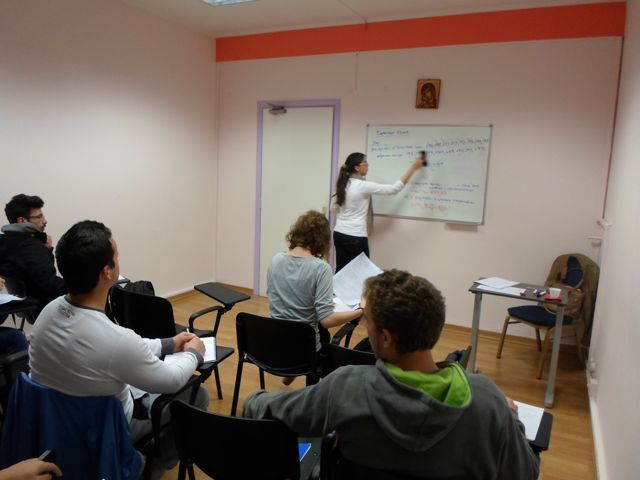Photo: Simona Peneva
Simon Peneva
Attending private lessons in Greece has spread to such an extent that it is regarded as a mandatory part of the education of secondary-school students. Some of them start attending these extra lessons when they are in the 7th grade and continue until their 12th grade. The variety of the lessons offered is great but, regardless of the choice of each individual child, the amount to be paid is always high. Schools seem to have accepted this fact and they too take these lessons as a required investment, especially for secondary-school graduates in order for them to be able to obtain the desired mark in the university admission exams. Since they are really difficult, students often have no choice but to enrich their education with private lessons. Their parents start to look for lessons that are most beneficial from an economic standpoint in order for their children to attend them. This is an additional financial cost for the families, the majority of which are anyway faced with poor financial circumstances because of the economic crisis.
The Archdiocese of Athens has long been aware of this problem. Last year, it found a solution and organized free lessons for all students from the 7th through the 12th grades thus helping not only children but also their parents. The lessons took place in the library of the Archdiocese throughout the school year. A large number of students wanted to attend them and therefore the lessons will continue next school year too. Moreover, during the summer vacation there was a special additional training for secondary-school graduates to enable them to cover the school subjects for their upcoming university admission exams.

At the beginning of the 2013-2014 school year, the interest was even greater and the number of children reached 220. The classrooms this time are not in the library of the Archdiocese but on a rented floor of a building in the centre of Athens, which has 19 classrooms and a small library. The students from the 11th and 12th grades are divided into the following four classes: the first is in theoretical subjects, the second in exact sciences, the third in technology and the fourth is for children studying at vocational schools. The students attending the first class are divided into three groups, those attending the second into two, and the third and fourth consist of one group, so that the number of students in a class allows the teacher to individually work with each of them. The students attending the theoretical subjects have six classes in Ancient Greek, two in Latin, History, Greek Language and Literature. The exact sciences include six classes in Mathematics and two in Physics, Chemistry, Biology and Greek Language, whereas the students in the technology group have six classes in Mathematics and two classes per week in Physics, Programming, Business and Management Principles, and Greek Language.
Therefore, the students attend 14 classes a week in the main subjects in which they will give exams. In addition to the previous five subjects that are mandatory, the students can choose one more subject such as Biology, Physics, Mathematics and History. Those who prefer Mathematics are eligible to sit for the exam in Economics. The classes in these subjects are also two. A bonus for the students is the tests that take place every second Saturday and resemble university admission exams. The time they have is the same, 3 hours, and then the teachers evaluate the tests based on the evaluation criteria for university admission exams.
The teachers who teach the children also work without pay, for the benefit of the students. Each of them applies for admission in the system and works as a volunteer. The teachers are professionals and the majority of them are engaged in the same profession at public schools. They prepare school materials for the students, give them homework which they afterwards examine and evaluate, they examine the students and motivate them to aim high and believe that they will succeed. Every one of them spends their spare time, even on Saturday, to help the children.
The preparation of the programme of studies each week, the notifying of students of every subject that interests them and of the working hours of the organization are the responsibility of secretary Mrs. Dimitra. Mr. Steryos is in charge of making copies of the numerous materials and directing the students to the classrooms and Mrs. Soula of cleanliness. All this proves that this organization is no different from the paid ones.